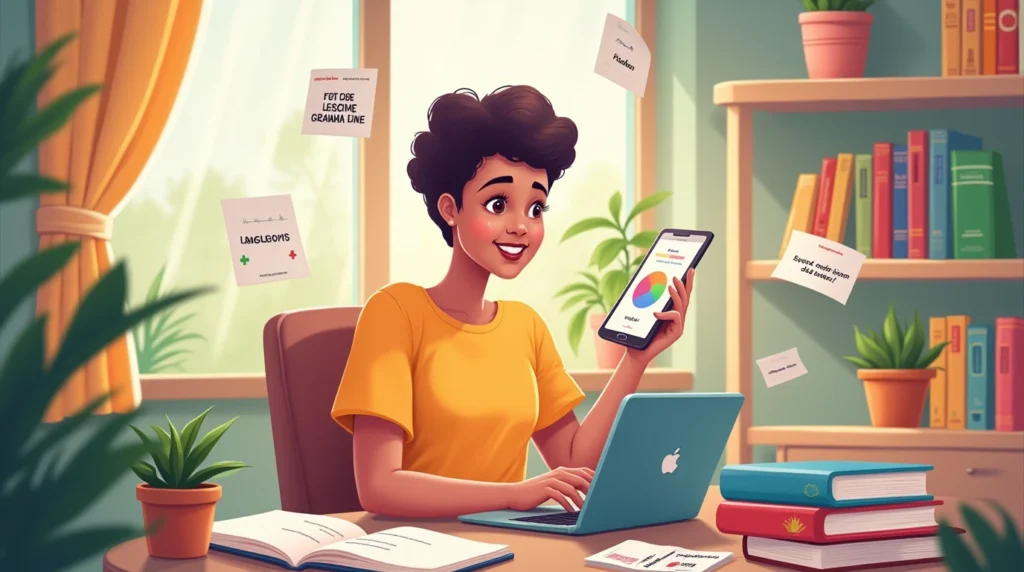Diving into Portuguese? You’ve probably noticed those tricky “Articulos del portugues”! Don’t worry, they’re essential for natural-sounding sentences. Think of them as the glue holding your phrases together. This guide will demystify these tiny but mighty words, explore their importance, tackle common mistakes, and offer practical strategies to master “artículos.” It’s easier than you think, let’s get started!
Table of Contents
What are “Articulos del portugues” in Portuguese, Anyway?
Before we dive deeper, let’s define “artículos.” They’re words before nouns that signal if you’re talking about something specific or general. Think of them as clues for your listener. For example, “the dog” refers to a particular dog, while “a dog” refers to any dog. Portuguese has definite and indefinite articles, essential for conveying accurate meaning. Let’s explore them.
Definite Articles: The Portuguese “The”
Definite articles are used when you’re talking about something specific, something that you and your listener both know. In English, we only have one definite article: “the.” However, in Portuguese, we have four! Yes, you read that right. It all depends on the gender and number (singular or plural) of the noun.
Here are the Portuguese definite articles:
- o (masculine singular): for example, “o livro” (the book)
- a (feminine singular): for example, “a casa” (the house)
- os (masculine plural): for example, “os livros” (the books)
- as (feminine plural): for example, “as casas” (the houses)
See? It’s all about matching the article to the noun! It might seem like a lot to memorize at first, but with a little practice, you’ll be using them without even thinking. Think of it this way: “o” is like the male single “the”, “a” is like the female single “the”, “os” is like the male plural “the” and “as” is the female plural “the”.
“The Portuguese language is not just a collection of words and grammar rules; it’s a vibrant expression of culture and history. Mastering articles is like unlocking a secret code to that world.”
Indefinite Articles: The Portuguese “A” or “An”
Now, let’s talk about indefinite articles. They’re used when you’re talking about something not specific, something in a general sense. Just like with the definite articles, they change based on gender and number, meaning there are four indefinite articles in Portuguese as well. Think of it as the equivalent of “a” or “an” in English. Here are the Portuguese indefinite articles:
- um (masculine singular): for example, “um carro” (a car)
- uma (feminine singular): for example, “uma flor” (a flower)
- uns (masculine plural): for example, “uns carros” (some cars)
- umas (feminine plural): for example, “umas flores” (some flowers)
Indefinite articles bring vagueness to the party, implying that you’re talking about a non-particular item or quantity, instead, you’re referring to any member of the category. It is not specific like the definite articles. It’s about conveying the idea of “one,” “a,” or “some” without focusing on any specific individual. You’ll see, it’s all about subtle distinctions.

Why Are Portuguese Articles So Important? Articulos del Portugues
Alright, so we know what articles are, but why should you care? Why are these tiny words so important? Because they carry a ton of weight when it comes to clarity and natural-sounding speech. They’re essential not only for grammatically correct sentences, but also for avoiding confusion. The articles help to define the subject and object in the sentence. Missing them out or using the wrong ones can lead to misunderstandings or sound completely odd to a native speaker. Let’s look at some important reasons for their importance.
Understanding Gender and Number Agreement: Articulos del Portugues
As we mentioned, Portuguese nouns have grammatical gender—masculine or feminine. This isn’t inherent to the noun itself; it’s how the language works. Articles must agree in gender and number (singular/plural). This is crucial in Portuguese grammar. The gender isn’t always obvious, so you must learn it with the noun. Incorrect article agreement immediately signals an error, even if other parts are correct. It’s key for correct expression.
Articles and the Nuances of Meaning
Articles aren’t just grammar; they impact meaning. Choosing between definite or indefinite articles changes context entirely. It’s more than just “the” vs. “a.” Definite articles mean specific; indefinite mean general. Sometimes omitting articles is grammatically correct, but changes nuances. Articles can also imply prior knowledge about something mentioned. This shows their subtle but crucial role in communication.
Common Pitfalls When Using Portuguese Articles: Articulos del Portugues
So you’ve grasped the basics, but let’s be real – it’s not always smooth sailing. There are common mistakes learners make when using Portuguese articles, and knowing what to watch out for will really speed up your journey to mastering them. These are some of the areas where people often get stuck, so by understanding them, you’ll be one step closer to fluency. It’s just part of the learning process, don’t get discouraged!
Forgetting the Gender of Nouns
Gender is crucial in Portuguese, but it’s not always obvious. Noun gender isn’t predictable; a word might seem feminine but be masculine. Unlike English, grammatical gender is assigned arbitrarily by the language – there’s no logical reason. You must memorize each noun’s gender. There’s no shortcut. Learn nouns with their articles. This will train you to use the correct articles naturally.
Overusing or Underusing Articles in Specific Contexts
It’s not just wrong articles, it’s also about using too many or too few. Article use varies in specific contexts. For names, you omit articles (“Maria é bonita”). Generalizations or habits may also omit articles (“Eu gosto de café”), unlike English. Getting used to these exceptions is tricky and requires practice and exposure. Unlearning incorrect habits takes effort.
Difficulty with Contractions Involving Articles
Ah, contractions! This is where it gets interesting. Portuguese loves to combine prepositions with articles, forming contractions. For instance, “em” (in) + “o” (the) becomes “no.” This can be confusing for beginners because it changes the appearance of the word. There are several of these, and you’ll have to learn them. Here are some common ones:
- de + o = do (of the)
- de + a = da (of the)
- em + o = no (in the)
- em + a = na (in the)
- a + o = ao (to the)
- a + a = à (to the)
The difficulty comes when these words are mixed and used quickly in conversation. However, with enough practice, you’ll get used to the way they are used and will begin to understand them quickly and easily. You have to know that they are the result of a combination of the two words, so that when you use them, you can understand the true meaning of what you are reading or listening to.
“The most challenging aspect of mastering articles in Portuguese isn’t memorization, but learning to listen and speak naturally, using them as an unconscious part of your language toolkit.”

Practical Tips and Tricks for Mastering Portuguese Articles: Articulos del Portugues
Okay, enough with the problems! Let’s focus on solutions. Here are some actionable tips and tricks to help you make Portuguese articles your friends. It’s about adopting the right strategies, making learning fun, and ensuring you’re always progressing. These tips are all very practical, and you will see that they will be very helpful.
Practice, Practice, Practice: The Key to Success
Yes, it’s a cliché, but it is true: the more you use Portuguese articles, the better you’ll get at it. Engage in a lot of active practice – speak, write, and translate. Try to identify the articles used in sentences. Try to recreate sentences and use the correct articles. The more you practice, the more instinctive it becomes. Do exercises. Create your own sentences with different types of nouns, different genders and numbers. You will be surprised by the effect and the great progress you’ll make in a short time. You can also talk to yourself, it doesn’t matter, but practice using the articles in all situations possible, as if they were something completely normal and everyday.
Using Flashcards and Memorization Techniques
Flashcards are key for learning noun genders and articles. Create them with the noun on one side and its gender/article on the other. Use physical or digital (Anki/Quizlet) versions. Test yourself often. Don’t memorize words alone; use the full expression (“o livro,” not just “livro”). Add memory techniques: use mnemonics, visualize, and associate images with the word/article. This connects multiple senses for better learning.
Immersing Yourself in Portuguese Media
Immerse yourself in Portuguese—like a deep dive into “artículos.” Watch movies, TV, listen to podcasts, and read books/newspapers. Notice how natives use articles in various contexts. This helps grasp spoken Portuguese nuances. Like understanding music after repeated listens, you’ll get used to articles through exposure. Pay attention, read aloud, and notice how articles are used.
Advanced Considerations: Articles in Complex Sentence Structures
Alright, you’ve nailed the basics. Now, let’s explore how articles behave in more complex sentence structures. This is where your understanding of articles moves beyond basic grammar. It’s about applying your knowledge in diverse situations. These aspects can be tricky at first, but with patience and understanding you’ll be able to tackle them.
Articles with Adjectives and Possessives
With adjectives, the article still agrees with the noun’s gender and number. Adjectives don’t change the article (“o livro interessante”). The noun is in control. The same applies to possessives (“o meu carro”). Always refer back to the noun; articles depend solely on the noun, not adjectives or possessives. Focus on the noun, and you’ll use the correct articles.
Articles with Abstract Nouns
Abstract nouns, like “happiness,” “love,” or “freedom,” can sometimes be tricky. They’re often used without an article in English. However, Portuguese usually requires an article even before abstract nouns when you refer to a specific instance. For example: ” A felicidade é importante.” (Happiness is important) However, sometimes you will find abstract nouns with no articles in generalizations. It’s all about context. When talking about abstract nouns in the most general way, you don’t need an article. This is not so difficult once you get used to it, but you will have to pay special attention and be careful of the context that you’re using.
Resources and Tools to Help You Learn Portuguese Articles: Articulos del Portugues
Okay, you’ve got the knowledge, but you also need the right tools for success. Here are some great resources that can help you learn Portuguese articles. They make learning easier, more fun and more efficient, and will help you in your language learning journey.
Online Grammar Websites and Apps
There are a number of fantastic online resources available that can help you study Portuguese grammar. Websites like “Practice Portuguese” or “Portuguesepod101” provide a wealth of information, explanations, and exercises. Language learning apps like Duolingo or Memrise can also provide great practice with grammar rules and exercises, so that you can improve your knowledge of Portuguese articles in a very entertaining way. These tools can give you instant feedback, making it easier to learn from your mistakes. They are also great for reinforcing knowledge and practicing grammar.
Portuguese Language Learning Books
Consider investing in a good Portuguese grammar book. A comprehensive resource book can provide a deeper dive into grammatical rules and exceptions that you might not find online. These books usually have a large number of examples, making them perfect for practicing. You can use them to deepen your understanding of the rules, so that you can use them more naturally. Look for books that include a lot of exercises and examples, so that you can work your way through them and practice the rules. This will make you more comfortable using them. Look for books from reputable publishers like Travelite Basics Portugal to ensure the content’s quality and accuracy.
Language Exchange Partners and Tutors: Articulos del Portugues
Nothing beats practicing with a native speaker. Find a language exchange partner or hire a Portuguese tutor. They can give you personalized feedback and help you refine your articulos del portugues usage in real conversation. They can help you understand the correct use of the article in diverse contexts. They can also help you recognize when you are using the incorrect article, and immediately correct it. This personalized practice will really help you take your learning to the next level. Consider local communities or online tutors near places like Caminha Portugal for authentic language practice.
“Learning a new language, especially when dealing with nuances like articles, is like climbing a mountain. It requires effort, but the view from the top is absolutely worth it.”
Frequently Asked Questions about “Artículos del Portugués” (FAQ)
Let’s address some common questions that learners often have. It’s good to know these answers as they’ll help you address some doubts that can emerge during your learning process.
Is there any difference between European and Brazilian Portuguese?
While both use the same basic rules for articles, there can be minor differences in usage and emphasis. For example, Brazilian Portuguese tends to use articles more frequently in some contexts than European Portuguese, especially before names. These are subtle but still important. There are some differences in the way that articles are contracted with prepositions. These subtle differences can be difficult to grasp at first, but with enough practice you will be able to distinguish the differences.
Are there exceptions to the article rules?
Yes, like in any language, there are some exceptions to the general rules. There are certain expressions and specific scenarios where articles might be omitted or used differently. As you progress, you’ll learn these specific cases. The more you learn the language, the more you will come across these scenarios, and you will be able to get used to these specific exceptions. They are usually related to particular expressions or particular contexts.
How can I effectively track my progress?
Keep a journal where you write Portuguese and monitor your correct and incorrect uses of articles. It’s like having a personal feedback loop. It’s a great way to see how far you’ve come and areas where you still need to improve. Be patient with yourself! There is no easy learning path, and every one learns at their own pace. Always make sure that you reflect on what you have learnt, what you are learning and how you are improving.
Conclusion: Your Journey to Portuguese Article Mastery (Articulos del portugues)
Mastering “artículos del portugués” seems tricky, but with the right approach and tools, you’ll succeed. Consistency and practice are key. Embrace learning, don’t fear mistakes, and immerse yourself. With focus and practice, you’ll gain confidence and use articles naturally. With work, you’ll speak fluent Portuguese like an expert! The world of Portuguese articles is waiting. Good luck and enjoy learning!



